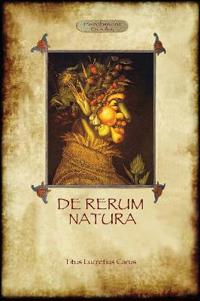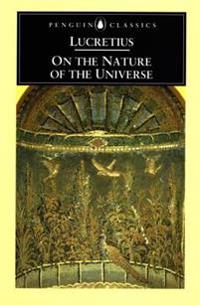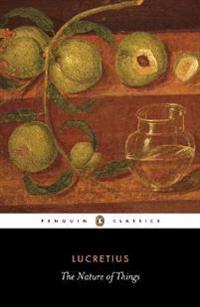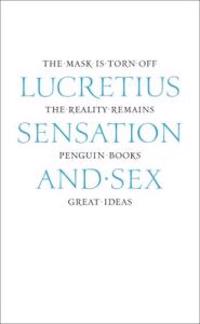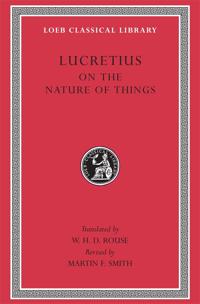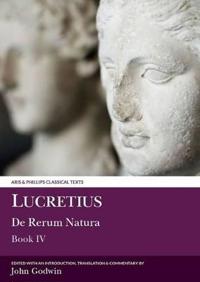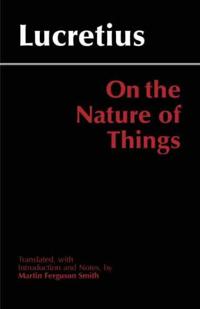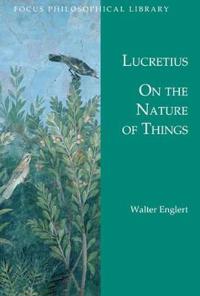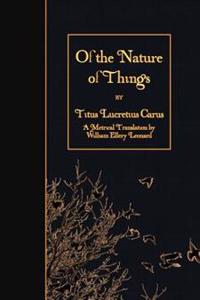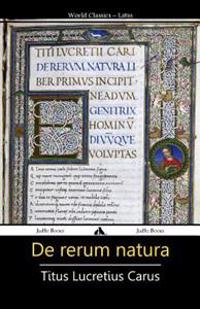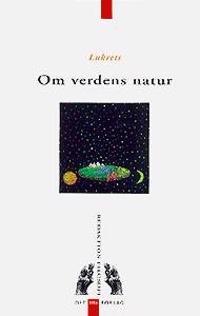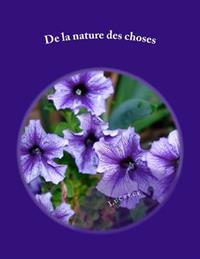Lucretius: de Rerum Natura I (Inbunden)
avLucretius Carus, Titus, Lucretius
ISBN: 9780862920760Lucretius offers his readers a complete guide to happiness and a total tour of the universe. Even a few selections from his poetry reveal the radical freethinker at his very best. This book draws on the latest research into the text and interpretation of Lucretius. It is aimed at the sixth-former or[...]
de Rerum Natura - On the Nature of Things (Aziloth Books) (Häftad)
avLucretius Carus Titus
ISBN: 9781909735057 - UTGIVEN: 2013-04On the Nature of the Universe (Häftad)
avTitus Lucretius Carus, Lucretius
ISBN: 9780140446104 - UTGIVEN: 1994-12This is a new verse translation of Lucretius's only known work, a didactic poem written in six books of hexameters. Melville's particularly literal translation of the use of metaphor is especially helpful to those looking at the text from a scientific or philosophical point of view.[...]
The Nature of Things (Storpocket)
avTitus Lucretius Carus
ISBN: 9780140447965 - UTGIVEN: 200707Lucretius' poem "On the Nature of Things" combines a scientific and philosophical treatise with some of the greatest poetry ever written. With intense moral fervour he demonstrates to humanity that in death there is nothing to fear since the soul is mortal, and the world and everything in it is gove[...]
Sensation and Sex (Pocket)
avTitus Lucretius Carus
ISBN: 9780141023823 - UTGIVEN: 2005-08Throughout history, some books have changed the world. They have transformed the way we see ourselves - and each other. They have inspired debate, dissent, war and revolution. They have enlightened, outraged, provoked and comforted. They have enriched lives - and destroyed them. Now Penguin brings y[...]
On The Nature Of The Universe (Pocket)
avTitus Lucretius Carus
ISBN: 9780199555147 - UTGIVEN: 2009-02-01This is a new verse translation of Lucretius's only known work, a didactic poem written in six books of hexameters. Melville's particularly literal translation of the use of metaphor is especially helpful to those looking at the text from a scientific or philosophical point of view.[...]
De Rerum Natura (Inbunden)
avTitus Lucretius Carus
ISBN: 9780674992009 - UTGIVEN: 197506Lucretius (Titus Lucretius Carus) lived ca. 99-ca. 55 BCE, but the details of his career are unknown. He is the author of the great didactic poem in hexameters, "De Rerum Natura" ("On the Nature of Things"). In six books compounded of solid reasoning, brilliant imagination, and noble poetry, he expo[...]
On the Nature of Things (Häftad)
avTitus Lucretius Carus
ISBN: 9780872205871 - UTGIVEN: 2001-10Martin Ferguson Smith's work on Lucretius is both well known and highly regarded. However, his 1969 translation of De Rerum Natura -- long out of print -- is virtually unknown. Readers will share our excitement in the discovery of this accurate and fluent prose rendering. For this edition, Professor[...]
On the Nature of Things (Dodo Press) (Pocket)
avCarus, Titus Lucretius
ISBN: 9781406564808Titus Lucretius Carus (99 BC-55 BC) was a Roman poet and philosopher. His only known work is the epic philosophical poem De Rerum Natura, On the Nature of Things. Very little is known about Lucretius' life. One source of information is found in a letter Cicero wrote to his brother Quintus in Februar[...]
Om verdens natur (Häftad)
avTitus Lucretius Carus, Lukrets
ISBN: 9788790030650 - UTGIVEN: 1998-01Om verdens natur er oversat og gendigtet på heksametre fra latin efter De rerum natura af ægteparret Ellen A. og Erik H. Madsen - i øvrigt som deres sidste store oversætter- og udgiverindsats til glæde for danske læsere. "En bog om alt" kunne man kalde dette gevaldige læredigt på 7414 vers, [...]
de La Nature Des Choses: Lucrece (Häftad)
avMme Lucretius Titus Carus, M. Georges Ballin
ISBN: 9781495363658 - UTGIVEN: 2014-01



